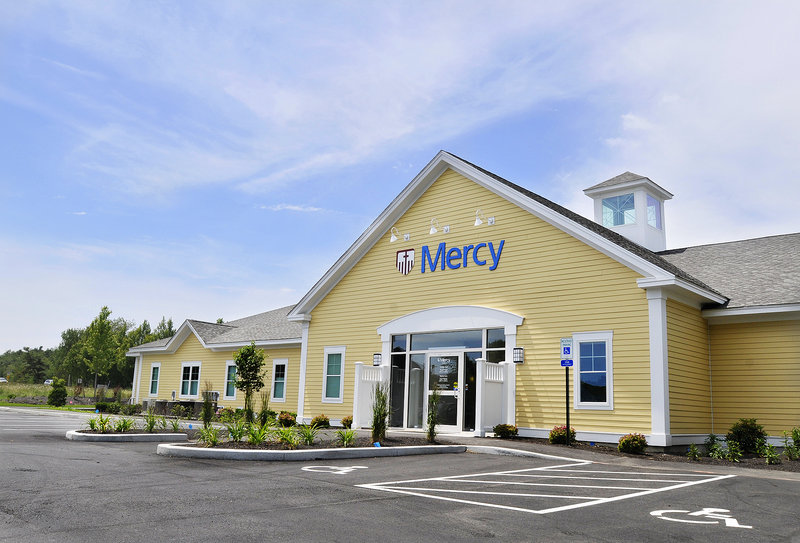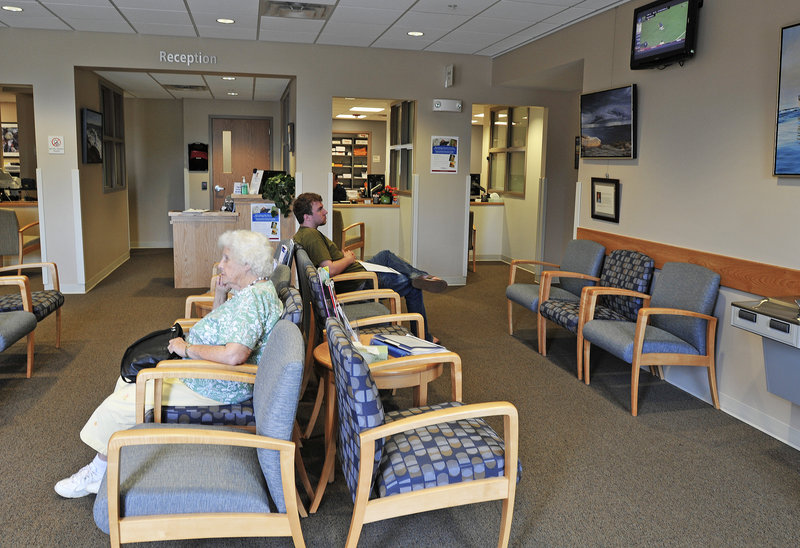Not long ago, Mercy Health System of Maine’s hospitals generated most of the organization’s revenue.
Today, the majority comes from elsewhere.
In the last five years, Mercy has opened new primary care doctors’ offices throughout southern Maine. Executives say the expansion is bringing lower-cost service to more Mainers and allowing Mercy to better coordinate patient care and expand off Portland’s peninsula.
They also say the move has helped Mercy respond to a decline in traditional hospital revenue.
“Our observation was that we had concentrated health care on the peninsula. From a business perspective, to have all services in downtown Portland is not a great way to bring service to a broader audience,” said Eileen Skinner, Mercy president and CEO. “We think we have a good model and are encouraged by what we see from it.”
Mercy has opened nine primary care doctors’ offices in southern Maine in the last five years. Many of them offer express care, radiology and laboratory services, and are open long hours.
The newest offices opened in March in Yarmouth and on Baxter Boulevard in Portland. The others are on Fore River Parkway in Portland and in Gorham, Falmouth, west Falmouth, Windham, Westbrook and Standish.
Skinner said Mercy plans to open another in 2012, and possibly one in 2013, though she didn’t say where. The primary care sites are strategically located on busy roads and near intersections so they are convenient to patients, said Skinner.
Mercy’s history stretches to 1918, when the Roman Catholic Diocese of Portland and the Sisters of Mercy established Queen’s Hospital during a flu epidemic. The place had 25 beds and was located on the corner of Congress and State streets.
In 1943, the Sisters of Mercy opened a new hospital — called Mercy Hospital — at 144 State St. The hospital, which is on three acres and still operates, received a major addition in 1952 and was renovated in 1982.
In 2008, Mercy opened a new 42-acre campus on the Fore River in Portland. The facility, the first phase of a two-phase project, includes an 80,000-square-foot medical office building and a 151,000-square-foot hospital, according to Mercy’s website. The organization employs about 1,700 workers.
The second phase will include the addition of a new emergency department, inpatient medical services, surgery suites, a critical care unit and acute care beds.
Mercy plans to relocate all services from State Street to the Fore River campus by 2018.
Today, Mercy has 230 hospital beds and operates a free primary care clinic in Portland, a home health and hospice facility and a host of specialty care centers, including those in orthopedics, breast care, urology, cardiovascular care, diabetes and physical therapy. Mercy also runs McAuley Residence, which offers transitional housing for women, and Gary’s House, which provides housing for patients’ family members.
All health care delivery locations except VNA Home Health & Hospice are operated by Mercy Hospital, a subsidiary of Mercy Health System, said Michael Hachey, senior vice president of ambulatory services and network development.
Mercy Health System is an affiliate of Newtown Square, Pa.-based nonprofit Catholic Health East, which helps administer and manage more than 100 hospitals and health care facilities from Maine to Florida.
The organization is sponsored by the Sisters of Mercy of the Americas, Regional Community of Portland.
Executives say Mercy’s expansion into primary care came from a strategic planning process about five years ago. They say the move can help reduce emergency room and hospital visits — holding down health care costs — and allow Mercy to coordinate patient care across its network and focus more on preventing illness.
“Expansion into community-based health care matches what is happening in the communities and in the industry,” said Skinner. “The hospital is not the center of the universe. The community is the center.”
Steven Michaud, president of the Maine Hospital Association, said hospitals in Maine and elsewhere have made similar moves. In Maine, he said, hospitals now employ the vast majority of primary care doctors.
“Ten years ago we wouldn’t have been talking about this,” he said.
Among hospitals with primary care affiliates are Maine Medical Center, Southern Maine Medical Center, St. Joseph Healthcare in Bangor and St. Mary’s Health System in Lewiston.
Michaud said hospitals entered the business partly because doctors are increasingly seeking salaried jobs, which enable them to escape the administrative and health reimbursement hassles of private practice and minimizes exposure to malpractice lawsuits.
Michaud added that doctors also want a “more balanced life” than private practice provides.
Executives at Mercy say the expansion should help improve the organization’s financial health by giving it access to revenue from sources other than the hospitals.
According to documents filed with the Internal Revenue Service, Mercy Hospital reported net losses of $1.3 million in 2008 and nearly $5 million in 2009.
Hachey said Mercy Hospital lost money in 2010 on revenue of roughly $200 million, but declined to disclose the amount of the loss. He said the losses were not associated with primary care expansion.
Mercy’s 2010 Form 990 tax documents have not yet been filed and are due by Nov. 15.
The organization laid off 58 workers in March 2010 and another 75 in June 2010, but has hired employees to work at the primary and specialty care centers, said media releases.
Executives attributed the cuts and financial losses to the economic slowdown and declining numbers of hospital patients in recent years, a trend seen by other hospitals.
“In (2010) Mercy was making significant investments and a year in which all health organizations were being challenged by the economic downturn, as patients put off elective services and more individuals sought charity care,” said Hachey in an email. “We’re seeing positive signs in 2011 that things are moving in the right direction.”
Skinner said Mercy’s primary care offices are meeting their financial and patient goals.
“In the long term, there will be financial return,” said Skinner.
Hachey said outpatient services like primary and specialty care now account for two-thirds of Mercy’s annual revenue, with inpatient services accounting for the balance.
Five years ago, those numbers were reversed, he said.
Kevin Lewis, CEO of the Maine Primary Care Association, said hospitals with a hand in primary care can use it as a “lever … to positively affect downstream costs and outcomes in health care.”
And what’s good for hospitals may benefit patients, too, Lewis said, because many Americans don’t have easy access to primary care, even those with health insurance.
“That is a challenge facing (not only) Maine, but the entire country. And (it is) another reason why we need to build up primary care,” he said.
Jonathan Hemmerdinger can be reached at 791-6316 or:
jhemmerdinger@mainetoday.com
Send questions/comments to the editors.




